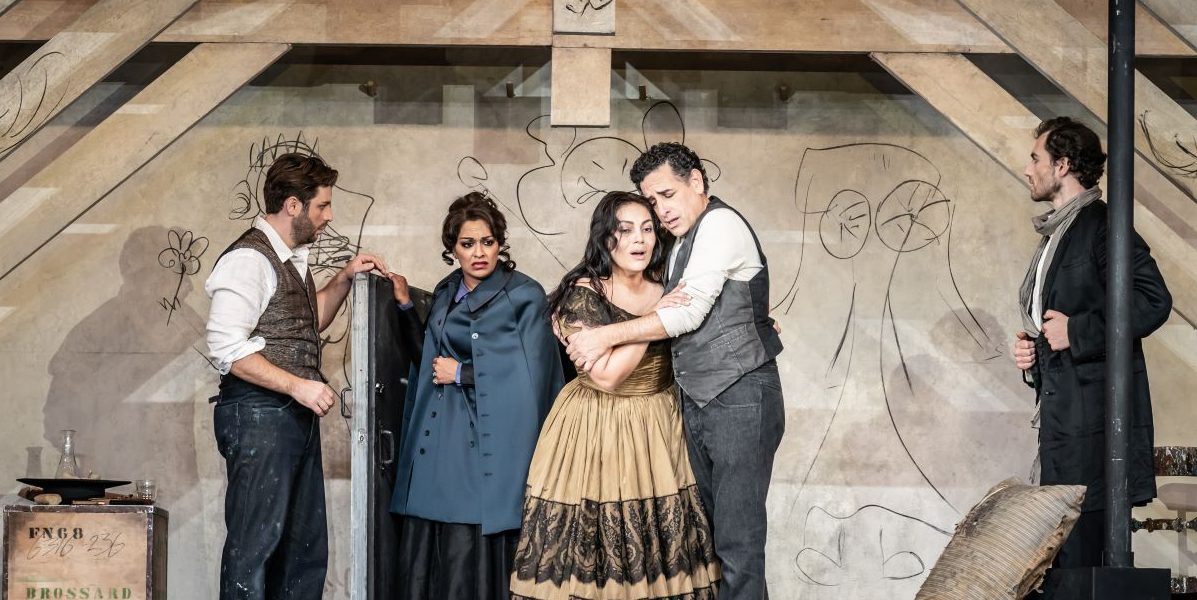Paris. An attic with no heating on Christmas eve, with four artists- Rodolfo, a poet, Marcello, a painter, Schaunard, a musician and Colline, a philosopher – sharing the garret and the rent. The pages of Rodolfo’s play fuel the small burner-heater in the room securing some temporary warmth. This seems a befitting reminder, of the plight of those who cannot afford heating this winter.
Richard Jones’s 2017 production of Puccini’s La Bohéme is tweaked by the revival director Daniel Urbas. Friendship and aspects of love are exposed and explored through an exquisite performance all round by the many members of the cast.
Based on Henri Murger’s novel Scenes of Bohemian Life (Scènes de la vie de Bohéme), with some important changes to ensure the storyline does not mirror Verdi’s La Traviata, Puccini’s La Bohéme finely balances relatable emotions and sentimentality. The opening night’s performance offered an evening where singing, orchestra and acting, worked in tandem and entertained the audience that filled the House to the rafters. The performance triggered the emotions but sustained a balance magnificently.
Juan Diego Florez’s Rodolfo has a clear tone, focused and elegant, which caressed his newly found love, ‘Mimi a hothouse flower’ who deserves a better place than his room which is ‘as cold as a cave’. He blazes movingly in ‘Che gelida manina’ . The lyric soprano Ailyn Perez’s Mimi, beautifully and convincingly conveys the fragile, delicate woman driven by her love for Rodolfo. Her aria ‘Donde lieta usci’ (Act III) is most touching. There was a touch of initial hesitation, but she quickly recovers her strength. Contrast Rodolfo and Mimi’s with that of the flatmate Marcello, superbly performed by the baritone Andrey Zhilikhovsky and his on-off lover, Musetta, impressively and with a great deal of humour, performed by Danielle de Niese, and you get the fire that ignites this drama. Zhilikhovsky is charismatic. His supple voice and performance dominate the narrative. He is a natural actor and a superb singer.
This production juxtaposes seemingly, two very different love affairs. Yet, as in life, no emotion is in isolation. The storyline is impressively formed, and the production teases out the delicate balance of various aspects of friendships and love without veering too much to sentimentality. The two couples move naturally and are comfortable on stage. It is when the four tenants are together in the attic, that confined space seems to offer a harmonious venue for the four ‘tenants’. Jeremy White’s Benoît, their landlord, delightfully performed without making a buffoon of the old man.
Steward Laing’s simple yet effective stage design forces the singers to navigate a confined space, alluding to the frustration of the crowded accommodation. The leading ladies’ dresses mirror not only their social status but their mood and the image they project. It is particularly noticeable where Musetta’s bright red dress is replaced by modest dress of dusty blues which complements Mimi’s grey-blue dress in the final scene.
I have seen a few productions of La Bohéme, but this performance with the current cast offered me a new experience. It can be highly recommended even to those who have never been to an opera before – here you have drama and singing rolled beautifully into one!

